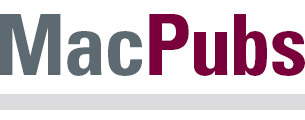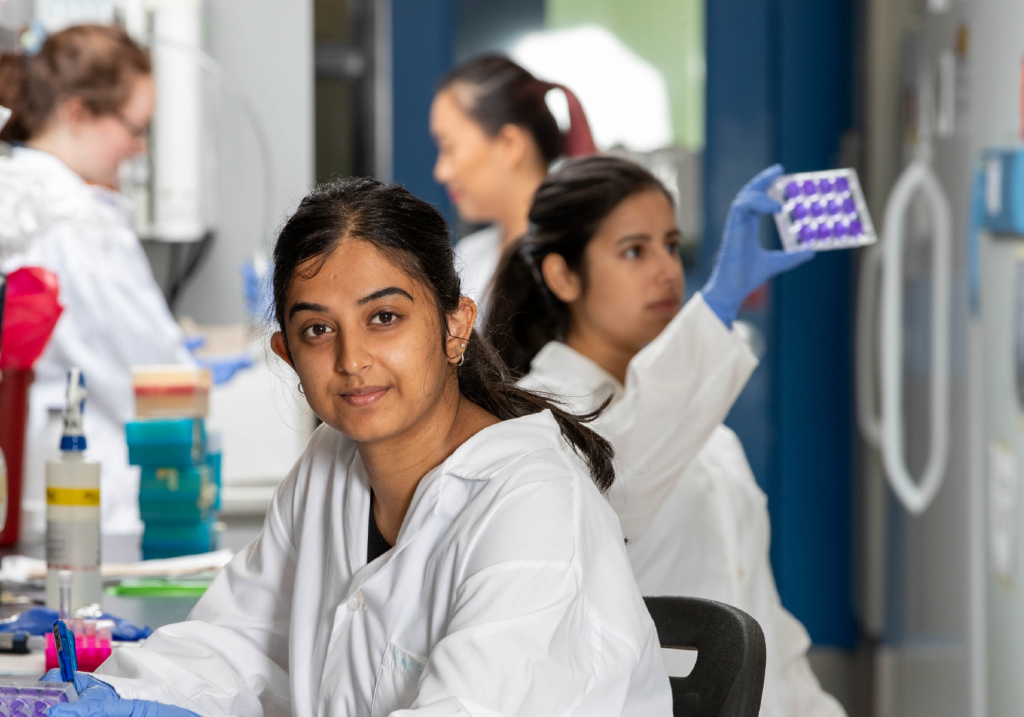Priority 3: Research and Scholarship
Global leadership and impact that continues to redefine how McMaster engages in research and scholarship, while exploring human knowledge and understanding
Information Box Group
The strength of McMaster’s research enterprise is again evident in the 2021 rankings of the world’s most highly cited researchers from Clarivate Analytics. Twenty McMaster scientists, including 18 from the Faculty of Health Sciences, are among the top one per cent by citations worldwide.
Learn More
Canada’s Global Nexus for Pandemics and Biological Threats has been at the forefront of research and innovation. Hosted at McMaster, it is a hub for international networks of experts and partners who can act quickly in the face of serious and emerging threats to global well-being:
Learn More
In addition to the McMaster Nuclear Reactor (MNR), McMaster houses a unique integrated suite of nuclear-related research facilities and world-leading experts, enabling the university to make discoveries in medicine, clean energy, and nuclear safety:
- McMaster and Laurentis Energy Partners continue to collaborate on the Clean Energy-Materials Sorting and Recycling Research Initiative, developing new methods and technologies to optimize the sorting and recycling process of low-level waste materials.
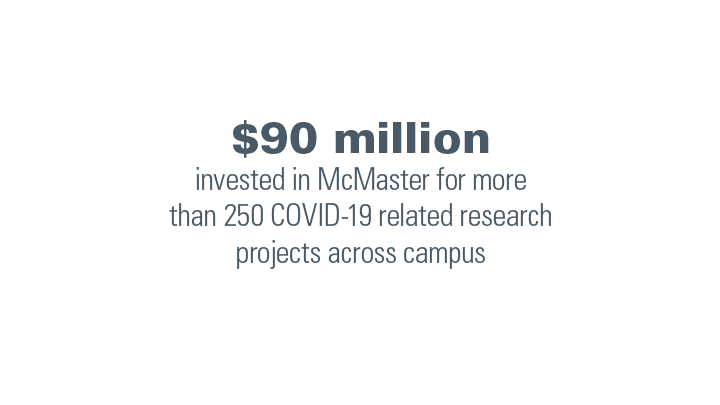
Information Box Group
Learn More
McMaster researchers continue to tackle issues on aging and how the increasing age of our population impacts individuals, families, communities, and health and social care systems:
In October 2021, researchers in the Faculty of Social Sciences officially launched the Initiative for Advanced Research on Mental Health and Society (ARMS), whose mission is to raise awareness of the social dimensions of mental heath by highlighting the important research taking place in the social sciences.
Learn More
In 2020-2021, researchers from across McMaster were recognized for their contributions to Canada and their impact on the global stage. Awards included an Order of Canada, election to the Royal Society of Canada’s College of New Scholars, Artists and Scientists, a Canada’s Most Powerful Women:
Learn More
McMaster researchers continue to lead critical research that promotes the health and well-being of our local, national and global communities:
Learn More
McMaster continues to promote collaborative research and leadership in the areas of health and medicine:
In the SMA 2019-20 reporting year, McMaster’s proportion of Ontario funding from federal research granting agencies was 10.3 per cent (source: Tri-Agency Institutional Programs Secretariat; Strategic Mandate Agreement Metric 6), and McMaster attracted approximately $191 million from private sector and not-for-profit sources (source: Council of Ontario Finance Officers; Strategic Mandate Agreement Metric 8).
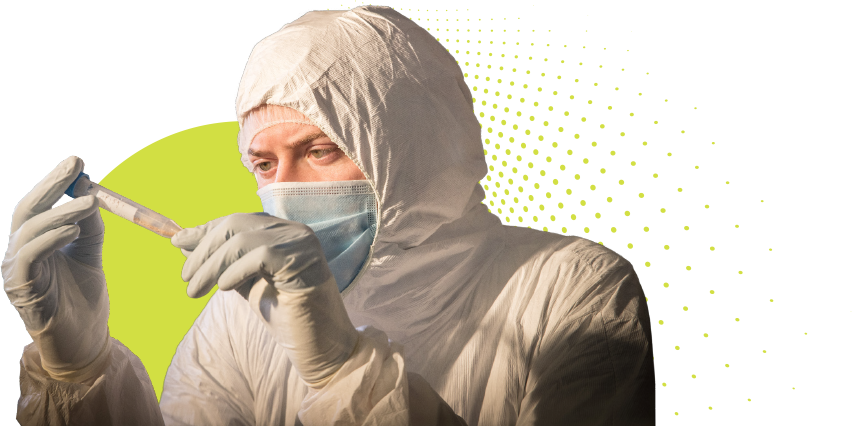
Information Box Group
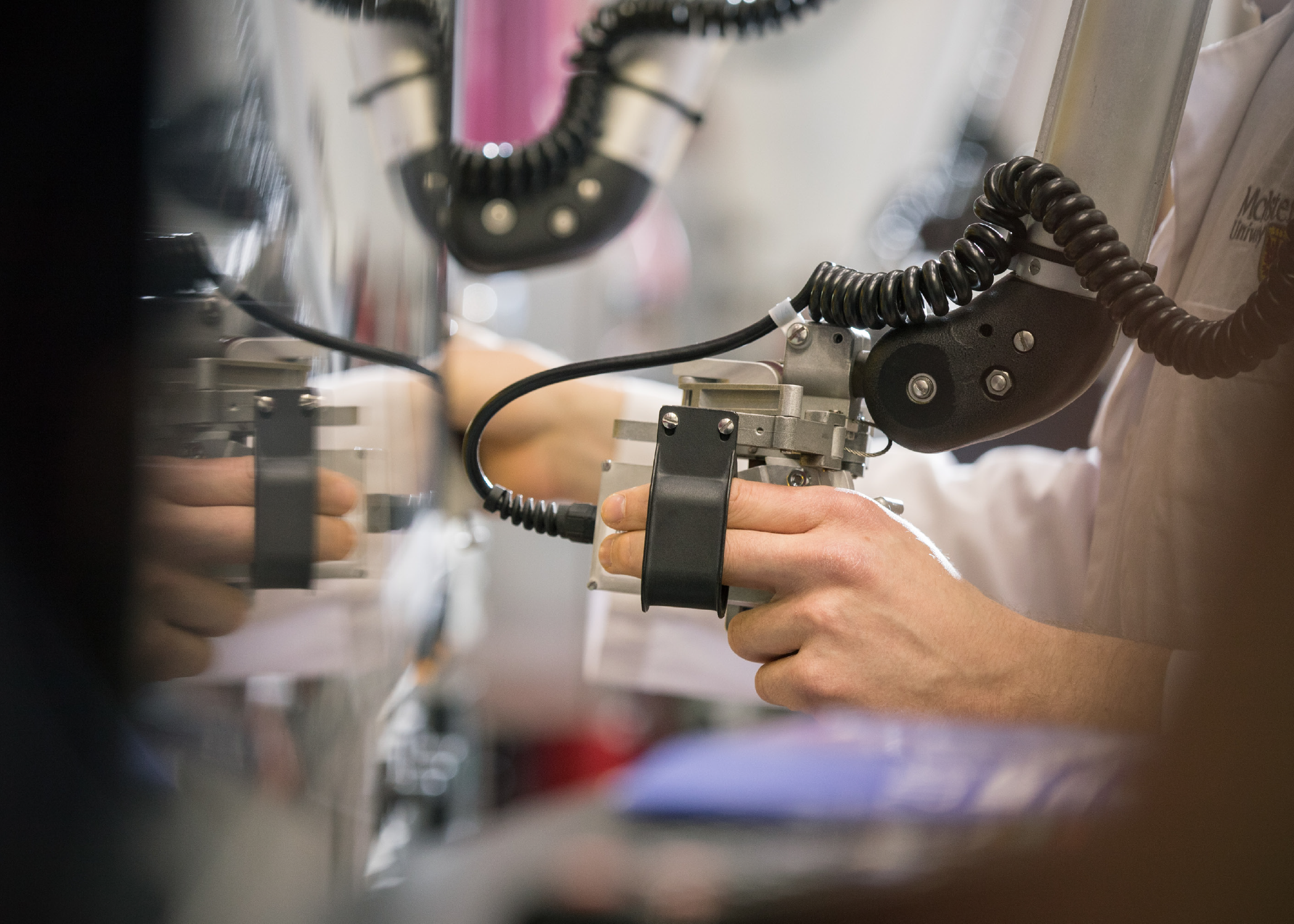
Information Box Group

Be a driver of economic prosperity and social innovation
Information Box Group
Learn More
Launched this year, the McMaster Seed Fund is an early-stage investment vehicle designed to foster innovative start-up companies coming out of McMaster research with the potential for significant economic and/or societal impact in the Hamilton region and beyond.
Learn More
Over its seven-year history, The Forge has incubated 269 companies that have gone on to raise over $42M in funding. Since it opened its doors in 2015, The Forge has been a driver in engaging with students to foster a culture of entrepreneurship and a strong supporter to accelerate the growth of early stage start-ups. Through its workshops and in collaboration with ecosystem partners, the Forge reached 7080 students in the past year alone. Last year, The Forge provided support to 45 start-ups founded by McMaster students, alumni, and entrepreneurs across Southwestern Ontario.
Learn More
The McMaster Industry Liaison Office (MILO) bridges the gap from research to commercial application and creates positive economic and social impact in the region:
Learn More
McMaster researchers continue to make innovations and advancements related to equity, diversity and inclusion:
Between September 2021 to August 2022, undergraduate and graduate students who participated in the Office of Community Engagement’s co-curricular Research Shop program contributed approximately 5,760 student volunteer hours, undertaking 18 research projects developed with community partners.
Collaborations and partnerships that expand our international outreach, influence and impact through research partnerships, collaborations and exchanges
Information Box Group
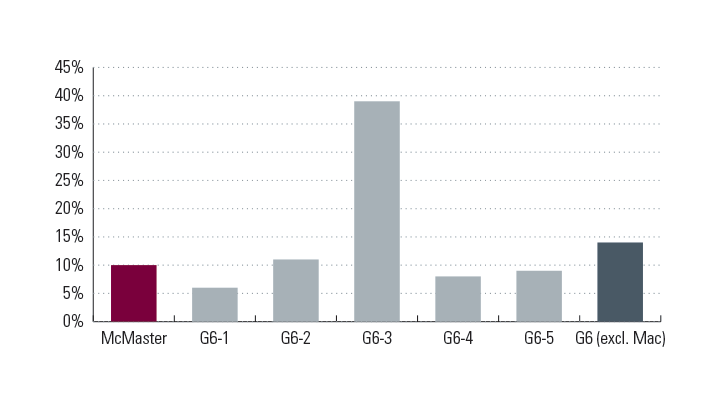
Research Funding and Capacity: Federal Tri-Agency Funding Secured - 2019/20
Note 1: Data sourced from Research Support Program, The Tri-Agency Institutional Programs Secretariat (TIPS)
Note 2: Amount and funding received by McMaster from federal research granting agencies and proportion of total Tri-Agency funding received by Ontario Universities.
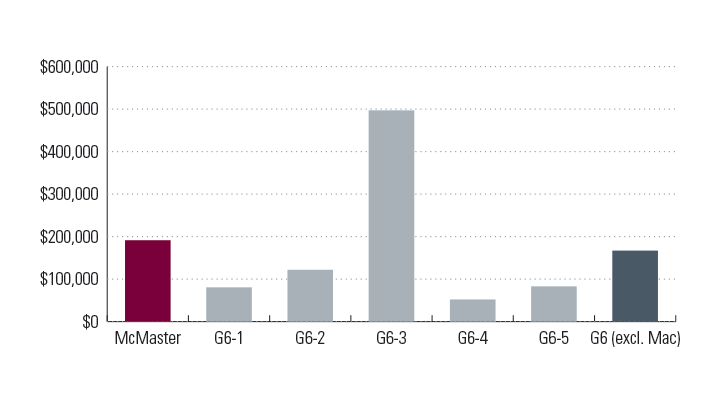
Research Revenue Attracted from Private Sector Sources - 2019/20
Note 1: Data sourced from Council of Ontario Finance Officers (COFO).
Note 2: Total research revenue attracted from private sector and not-for-profit sources.
Note 3: This metric is calculated based on the rolling average of the three most recent years.
Information Box Group
McMaster’s Global Health program organized the 11th annual Global Health International Learning Symposium together with consortium partners Maastricht University (The Netherlands), Manipal Academy of Higher Education (India), Universidad del Rosario (Colombia) and Thammasat University (Thailand). This annual symposium brings together over 300 students, faculty and staff to discuss and share research on pressing global health topics.
Researchers in the Faculty of Science have created Canada’s first carbon map in partnership with the World Wildlife Federation Canada to help guide the non-profit’s conservation efforts across the country to ensure massive carbon reservoirs are not disturbed. The map was unveiled during the COP26 United Nations Climate Change Conference.
Cubic Corporation has partnered with McMaster, investing more than $2 million to create the Centre of Excellence of Artificial Intelligence and Smart Mobility. The long-term project will allow researchers at the McMaster Automotive Resource Centre to design the future of inclusive mobility, address complex issues facing transportation systems and train the next generation by bringing diversity to product development and innovation.
McMaster received funding from eCampus Ontario to explore the applicability of verifiable credentials and decentralized identifiers in the Ontario postsecondary education sector. This is part of the university’s continued participation in the Digital Credentials Consortium – a partnership of 12 international universities working together to build a shared infrastructure for digital academic credentials.
More than $2 million from Eaton and Mitacs will help accelerate the development of more powerful and affordable electrified vehicles (EVs), including hybrid, battery, plug-in and fuel cell technologies, all of which will be critical in helping lower emissions, reduce fossil fuel usage and help mitigate climate change. The project will provide graduate students and postdocs with a unique opportunity to gain hands-on experience in the field.
Mitacs and ArcelorMittal Dofasco are funding research at McMaster to determine the mechanism and kinetics of melting carbon-free direct reduced iron made using hydrogen reduction to eliminate CO2 from steel production, and its impact on Electric Arc Furnace steelmaking process.


